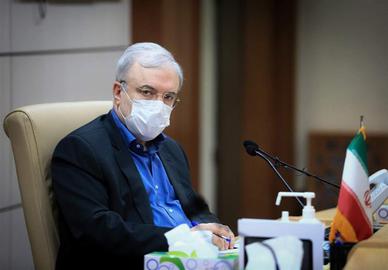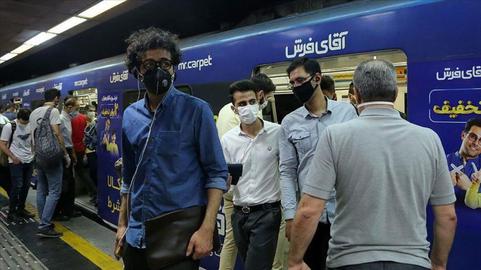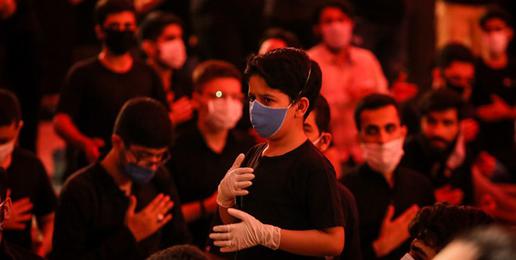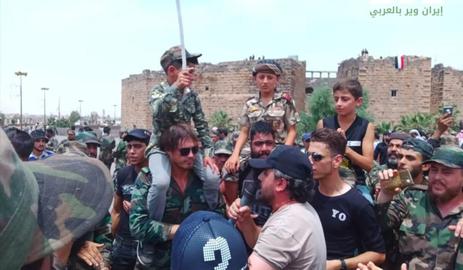In her daily briefing on July 28, the spokesperson for Iran’s Ministry of Health, Dr. Sadat Lari, announced that 235 people had died in the last 24 hours, a record for Iran. Twenty-six of 31 Iranian provinces are now officially on emergency (“red”) or severe (“orange”) alert for coronavirus. Among those 26 is Tehran province, Iran’s most highly-populated province. It’s the first time the area has been classified as being on emergency alert since the epidemic began.
And yet, government officials are still discussing how the country will mark Shia mourning ceremonies. There has not been any serious discussion of canceling the events, which are due to take place on July 31, August 7, and August 29. Instead, authorities have insisted that ceremonies on August 29, which mourn the martyrdom of Imam Hossein, will be held with “passion” and claim health protocols for marking the ceremonies had already been put in place as of July 28.
Two other significant religious occasions are due to take place before the August 29 ceremonies. Eid al-Adha, which honors the willingness of Ibrahim to sacrifice his son, is due to take place on July 31, and Eid al-Ghadir, which commemorates the time when the Prophet Mohammad appointed Ali ibn Abi Taleb, the first Shia Imam, as his successor, will be marked on August 7. What safety measures should be put in place to mark these occasions continues to be a bone of contention between officials. Deputy Health Minister Alireza Raeesi said that nothing about these ceremonies has been finalized and if they are held at all they would be in a very limited manner. He reiterated that the health ministry is clear that large crowds should be banned during the these ceremonies, especially if they are held indoors.
Contradicting this, the National Coronavirus Taskforce’s information office published its health protocols, stating that public mourning ceremonies are allowed in indoor spaces at specified times and for a limited number of hours in mosques and other religious sites, provided that these sites and their management are approved by provincial coronavirus taskforces.
All Hospital Facilities Being Used
In the early days following the outbreak in Tehran, six or seven hospitals in the capital were dealing with coronavirus patients. Today, many more hospitals are being used to deal with the crisis, including a private hospital with 1,000 beds. Furthermore, all hospitals in the country are required to have coronavirus wards, according to Deputy Health Minister Ghasem Jan-Babaei. He said two or three hospitals in each province are dedicated to coronavirus patients and, altogether, 200 hospitals in Iran offer medical services exclusively to Covid-19 patients.
On July 24, Kylie Moore-Gilbert, a British-Australian academic serving a 10-year sentence in Iran for espionage, was moved to a remote prison south of Tehran that is said to be riddled with coronavirus cases, according to rights activists and Reza Khandan, who said he spoke to Moore-Gilbert by telephone. Her transfer to Gharchak, a notorious and isolated women’s detention facility southeast of the capital, raised further concerns about her deteriorating health.
Could Exams and Ceremonies Lead to a New Spike?
Some commentators have predicted that if the nationwide university entrance exams and public religious ceremonies take place as planned, there could be a 60 percent jump in the number of coronavirus cases. When pushed on the matter, Deputy Health Minister Raeesi did not provide a clear response. Instead, he talked in general terms about variables and the modeling on which these predictions had been based.
Mohammad Bagher Ghalibaf, speaker of the parliament, wrote to Supreme Leader Ayatollah Khamenei, asking him to instruct the National Coronavirus Taskforce to include chairmen of the parliament’s health, education and social affairs committee as members so that they can argue their case against holding nationwide university entrance exams.
“We have no clear picture of what will happen with the coronavirus pandemic in Iran and, therefore, we cannot cancel or postpone any of the 2020 nationwide exams, including university entrance exams,” said Hossein Ghanbari, deputy health minister for educational affairs. He claimed efforts to cancel university entrance exams had created more stress for students and their families than worries about catching coronavirus had.
In a country as vast as Iran, no model of the epidemic can uniformly apply to all provinces and each province must be studied and managed according to its own cultural, economic, social and health system realities, said Health Minister Saeed Namaki.
Iran-Produced Vaccine
Namaki claimed to have good news about a homegrown vaccine for coronavirus, adding that Iran is catching up with advanced countries in terms of vaccine production. “We don’t want to make delusional comments and don’t want to say the vaccine will be available to the public until autumn,” he said. “Today, we can only say that we are not lagging behind many in the world who claim to have produced a vaccine.” He said Iran’s vaccine had “passed the initial tests and [we] hope to reach promising stages.”
Describing the production of the vaccine as a result of teamwork, the health minister said Iranian experts should exchange and share findings so that Iran will be among the first countries making tangible progress.
The minister also highlighted Iran’s success in synthesizing medicine for treatment of coronavirus despite the pressure of “cruel sanctions,” adding that two domestic pharmaceutical companies were ready to supply hospitals across the country with the antiviral medicine Remdesivir.
The head of the Food and Drug Administration of Iran said on Monday, July 28 that Iranian-produced Remdesivir would be put on the market within the next few days.
Provinces Round-up
Pointing out that Tehran’s situation is fragile and difficult, Dr. Alireza Zali, director of the Tehran Coronavirus Taskforce, announced on July 28 that all expositions and gatherings are banned because they pose high risks for people spreading the virus. He announced the extension of restrictions in Tehran for at least one more week. He also reported that in the last 24 hours 684 new Covid-19 patients had been hospitalized in Tehran, including 124 people receiving medical attention in ICU wards.
After more than two months in a red state of alert, the situation in Khuzestan has improved. The province it now on “orange” alert, according to Dr. Farhad Abolnejadian, president of Ahvaz University of Medical Sciences.
Every day approximately 400 patients with acute respiratory conditions and coronavirus symptoms arrive at hospitals in Hamedan province, and between 100 and 120 of them are hospitalized, said Dr. Ebrahim Jalili, vice president of Hamedan University of Medical Sciences. According to him, as of July 28, 575 Covid-19 patients were hospitalized in Hamedan and 36 doctors, 185 nurses and 64 other medical staff in the the province had been infected with coronavirus.
In the last 24 hours, 218 new coronavirus patients were identified in Markazi province, of whom 32 have been hospitalized, reported Mohammad Jamalian, president of Arak University of Medical Sciences. In the same 24 hours, he said, three other Covid-19 patients died, bringing the death toll in the province to 266.
The Daily Briefing
In her daily briefing, Dr. Sima Sadat Lari, the health ministry’s spokeswoman, reported that 26 of 31 Iranian provinces are now in red or orange states of alert, including Tehran, the most populous province in the country. On July 28, the province was labeled “red” for the first time since the first surge of coronavirus. She also reported that the number of daily hospitalizations was getting close to that of the first coronavirus peak in March.
She said the provinces of Tehran, Ardebil, Isfahan, Lorestan, Alborz, East Azerbaijan, Ilam, Razavi Khorasan, North Khorasan, Golestan, Mazandaran, Kerman, Semnan, Hormozgan and Fars are in a red state of alert and the provinces of West Azerbaijan, Khuzestan, Bushehr, Chaharmahal and Bakhtiari, Zanjan, Hamedan, Kohgiluyeh and Boyer Ahmad, Markazi, Yazd, Gilan and Qom are orange.
However, according to figures reported by provincial officials and universities of medical sciences, the provinces of South Khorasan, Qazvin, Hamedan, Sistan and Baluchistan, Bushehr and Markazi have been red, not orange, for the last few days, and according to the health ministry’s own criteria, the provinces of Kurdistan and Kermanshah must also be must added to the orange list.
In her daily briefing, Dr. Sadat Lari also announced the official coronavirus statistics for the 24-hour period ending on July 28:
- New coronavirus cases: 2,667
- New hospitalizations: 1,687
- Total cases since the outbreak: 296,273
- Total coronavirus tests conducted in Iran: 2,380,122
- Total recovered from coronavirus: 257,019
- New fatalities: 235
- Total death toll since the outbreak: 16,147
This is part of IranWire's coronavirus chronology. Read the full chronology
visit the accountability section
In this section of Iran Wire, you can contact the officials and launch your campaign for various problems




























comments